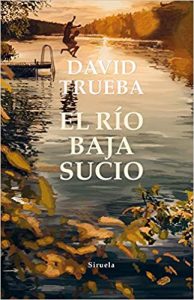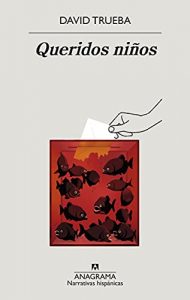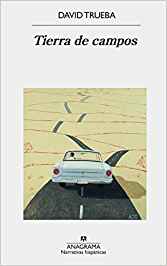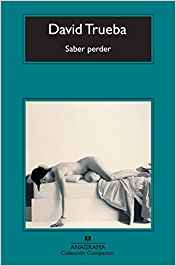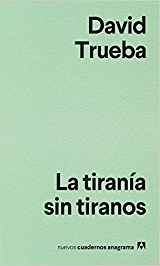From the script to the direction to finally assault the world of literature with the particular baggage of such a fruitful transition. David trueba He is already that writer who perhaps never thought he had been a journalist by training and screenwriter by vocation. But books arrive like this, from the hands of storytellers who, after all, are only looking for the right medium at the right time to end up transmitting them.
El David Trueba novelist and essayist Today, in many moments, he is still the scriptwriter who complements the characters in his stories with a multitude of gestures and dialogues filled with that life of those who really see each scene. That aspect of reflection that the essay confers also ends up adopting a vivid point in its criticism or its ideological approach.
The point is that in the manifest versatility of David Trueba, especially in fiction, we always find a life counter in its broadest consideration.
Determined to magnify intra-stories, to undress souls and reveal conflicts that always appear in our world, from the familiar to the emotional, with the protagonism of great very human feelings such as guilt, fear or that love ultimately capable of redirecting everything when it seems lose any sense or existential commitment.
Top 3 recommended books by David Trueba
The river runs down dirty
The bibliography of David trueba It already matches his filmography. And that in the cinema he has been both in front of and behind the cameras on very different occasions. A matter of knowing how to do. If this author is able to arrive with his stories in different formats and from very different prisms that reach up to the sociological essay with his work Tyranny without tyrantsSo this announced change of registry does not really surprise so much and it was expected in new registries with its proven ability.
It is true that, as on so many other occasions, in this river that runs dirty, Trueba soon seeks mimicry, winks, forms of connection with highly recognizable characters and settings visited by all. In this case something as universal as childhood. As exclusive from the individual perspective as it is so similar in the generality of the cases, Tom and Martin wander through the no man's land of the 14 years, that prelude to maturity in which the first experiences appear with intensity. Days in which any kid is tightrope walking about life, about old stories, about the harsh realities that loom, and all this with the uncontrollable energy of hormonal change.
The two friends are going to live that disruptive experience, let's say classic in other great works such as Sleepers o Mystic River, . Only to the Spanish, of course. And the natural progressive assumption of that bitter side of life explodes on the conscience of some kids that we accompany in that outbreak. Cleverly, David Trueba adds a nimble pace. A tension that is born from the boys' own search for adventure, in that period, in those ages in which the childhood paradise is losing its grace.
And of course, then the danger appears, the improper scenarios, the bad choices in search of a risk without any protection. That is what it is about, the bad choices when they become irreversible. When you know that the future will be loaded with guilt and remorse of the characters about themselves when they were children in search of something different.
Danae is a magnetic character for both, a girl who will exert the powerful echo of the claim. And once Tom and Martín enter the girl's life, with her sinister father, the consequences will be unpredictable. Innocence can be lost in a thousand ways, in many ways. Tom and Martín decided to take the step to maturity from that vague sense of infallibility of unconsciousness. A few years after those Easter holidays in town, the voice of one of the two friends will give us a good account of everything that happened . Nothing that cannot happen when a teenager encounters fear as a challenge and plunges into it without doubting for a moment that nothing can happen to him.
Dear children
This is a funny novel like a dinner with friends, but forceful as a hook to the liver. Some of that contradiction contains its protagonist, Basilio, whom his enemies nickname the Hippopotamus. A nickname that, at 119 kilos, makes him rejoice: he may aspire to the quiet stillness of that animal, who knows how to wait for his chance, but he is also attracted by his fierce nature, his aggressive instinct, his criminal intelligence. So when she is offered to leave her placid retirement for a few weeks to accompany Amelia Tomás, a candidate for president, on her electoral tour, the beast within her stretches out and acts.
Throughout a journey that will take him to all kinds of cities and towns in Spain, his mission will be to load the speeches of the candidate with dynamite, spray dialectical gasoline on his rivals and set fire to everything in his path. And it is that in this game competing is the least: the only acceptable thing is to win. Win, win and win.
David Trueba has written an unclassifiable novel, which portrays the world of politics and its backroom with a great eye for satire and unbiased observation. In a journey between comedy and the portrait of the natural through the interweaving of a political campaign, unspeakable ambitions, deceptions, half-truths, flagrant lies, hidden tensions and conflicts of private life that perhaps it is better not to see the light emerge; at the forefront of all this, a larger-than-life protagonist, hated by some and hated by others, and who instead of wondering with anguish if the glass of life is half empty or half full has long ago decided to drink it in one gulp . Overflowing and daring, vibrant and direct, Dear children is an autobiography of rancor that represents another step forward in one of the most successful novelistic trajectories in our literature.
Farmland
David Trueba seems to have fictionalized the script of a still unpublished film, a road movie that has taken the opposite path of the typical book-film process, but of course, only a film director can go through this process in the opposite direction film-book and that, also, it turns out well. Although time to time.
Perhaps soon we will see that road movie aboard the same hearse that the novel presents us, where a son accompanies his father to give him land.In the first pages that image already predisposes the reader to consider that the indicated son, Dani Fly, he's a singular guy. The fact of accompanying his father to his funeral, in the very hearse, together with a singular chauffeur who offers him the most inopportune range of conversations for someone from his guild, is tracing that idea of Daniel as a guy with the gift for find yourself the grotesque in all circumstances, because that kind of people exist.
This Daniel, like all daniel in the world, move in search of bewilderment, the annoyance of ambiguity and end up finding everything together. It may seem that Daniel is a chaotic, strange guy, surely you will already imagine in him a black, transgressive humor , acid. You are not wrong at all.
But the best of all is that meeting Daniel, in that universe as peculiar as it is attractive of Danish types, ends up discovering the grace of life between disappointment, the joy of living between disorder, the love between chance and best words between the chords of music.
Other recommended works by David Trueba ...
Know how to lose
There is no choice but to learn how to do it, to assume that it can happen, that failure can appear in the form of an unexpected setback or recognition of absolute emptiness.
To know how to lose nothing better than to compare the effort of other losers to confirm themselves as such or to surpass themselves ... After the strenuous effort towards triumph, the shadow of the abyss can appear.The perspective of the insubstantial on what has been lived is also a notion of failure, the dream of a loser who may be 16 or 90 years old, it doesn't matter. A intertwined story of four characters who pose the scenario of defeat from very different life perspectives.
Sylvia and her father Lorenzo, the footballer about to become a star Ariel Burano, and Leandro, an old man who discounts his hours between pending accounts, but it is not a fatalistic novel but a sum of intra-stories that invite you to smile at him. sarcastic humor of life. When one story ends another begins. It's just about getting up and walking again ...
Tyranny without tyrants
An interesting essay. It is about thinking a little about the transcendental, about the nuances of the fit between the anthropological and the social. And it is also about sharpening and making critical and reflective opposition about our drift as a civilization.
Reading this book highlights the contradictory need for individualism. Because it is natural to vindicate oneself as a person with one's own circumstances, but individualism is a double-edged sword at the service of various interests that, in the end, lead us to alienation ... If we stick to the conceptual, it could be said that we are already immersed in the dream society.
Rights of all kinds for any citizen, life expectancy, spaces to recognize all the singularities, democracy ... Thus, by boat soon, the idea is weighed down by that other world in which no previous goodness exists. And sadly we understand that it is a necessary counterweight, to the point of assuming catastrophic stories of that other world spilled by the news naturally ..., as long as they do not splash the West, where those of us who do have rights and freedoms live.
But beyond that balance, that gear between those from here and there, the contradiction continues to spread between our ranks, the inhabitants of the privileged world, because the great thinking minds have known how to give the best treatment to that historically won individualism as freedom and rights. Separated we are less strong, we are really vulnerable, we end up becoming our own enslavers.
Those who drive large political, power and economic interests ultimately know how to get the most out of us one by one. The result is that we end up believing that we are unique, free, capable of facing our destiny. But after the apparent society won in favor of equality, we end up being processed and screened elements. The information makes us part of the statistics towards consumption. New forms of business in which each of us add up to form a curve, a trend on a sinister graph.
It is true that our advanced societies can offer better living, health, and emotional conditions. And yet you will have observed that in the end all progress ends up being oriented to where the money is. Consumer happiness, consumer health, consumer love? In view of our drift, it seems as if there is only one last redoubt left, a space of conquest of our soul that the robots of the network cannot finish reaching.
And to continue defending that space and retaking new reconquests towards a more effective equality, there would be no choice but to unite again, each with its own particular space but composing a network with which to confront that other tangled network of the most evil interests. Trueba comes to expand on many of these aspects with a realistic perspective, sometimes fatalistic, but always confident of substantial change.

